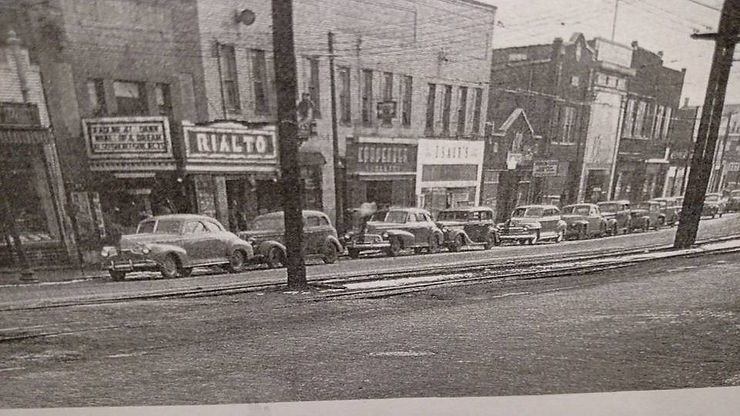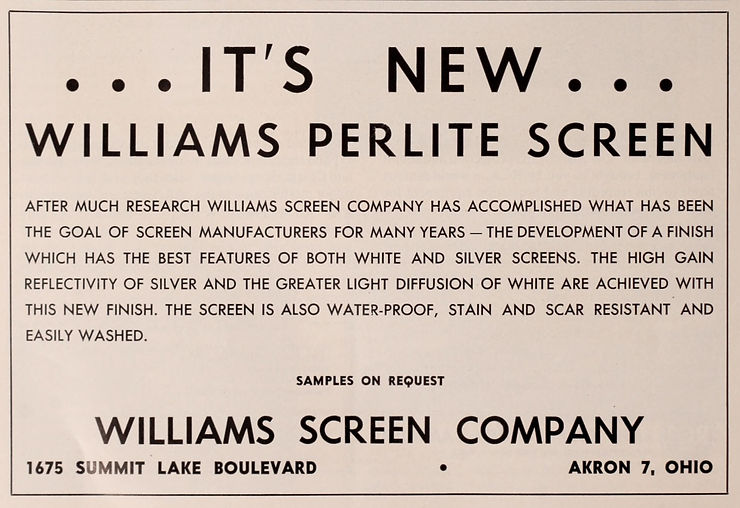
One hundred and twenty three years ago this week – on April 6, 1899 – the man who changed the way movies were seen forever was born.
In the early days of cinema, Harry Coulter Williams was living in Kenmore and working as a projectionist at two Akron movie houses: the Majestic (located in the Summit Lake district to the south of Downtown on S. Main Street), and the Norka (located on E. Market across from the Goodyear factory). Movie screens of the day left much to be desired and often times films would appear dim or dark to the viewer.

Williams himself described these early movie screens as “painted bedsheets” to the Akron Beacon Journal in 1966.
Ever the troubleshooter, the reels in the young projectionist’s head began spinning while he looked out at the dimly lit screen and he began to consider ways to potentially enhance the appearance of the movies he was projecting.
After some experimenting, Williams found what he was looking for one afternoon in 1925 in a canoe house along the western shore of Summit Lake when he tried painting a stout cloth with silver paint.
This was the day the “Silver Screen” was born and the movie industry forever changed.
Encouraged by the reflective properties of the silver paint, he decided to try it on the screen at the Majestic Theatre where it was a success – producing a brighter picture at all angles with top reflectivity at direct viewing and extra diffusion for movie goers seated in side seats and balconies.
Next, he painted the screen at the Norka Theatre and before too long he was producing his silver screens, which he branded as “Williams Perlite,” in Kenmore and selling them to theatres everywhere.
“Fox, Warner Brothers, MGM – they all picked up on it,” Williams’ daughter-in-law and former Kenmore High School teacher Jan Williams explained in an interview on Around Akron with Blue Green.
An early adopter of the silver screen was the Rakoci family-owned Rialto Theatre – located just down the road from the Williams Screen Company.

The Rialto Theatre had the first silver screen on Kenmore Blvd. The addition of the Williams Perlite, and an impressive marquee, enabled the smaller, 300-seat Rialto to stand out and compete with the larger 480-seat Boulevard Theatre, located just two blocks away.
Williams’ innovation extended beyond the silver screen.
In 1929, he started perforating his screens to let the sound of the first “talking pictures” through, and in 1947, he developed a vinyl plastic screen used to make larger screens.
He built screens and operated the Williams Screen Company on Summit Lake Blvd. until 1971 and was innovating right until the end of this life.

“He was experimenting with roll-up awnings for campers,” Jan Williams said. “If he’d lived longer he probably would have been in on that industry too.”
Harry Coulter Williams passed away at the age of 73 on February 10, 1973, but his legacy lives on today every time you see a movie in a theatre or hear the term “silver screen” used.
In 2015, the Rialto Theatre was restored to Kenmore Blvd. after closing six decades prior. While the contemporary Rialto Theatre is a music and performance venue (thought it does screen films on occasion), it pays homage to its movie house past and Harry Coulter Williams with a plaque honoring him in its ticket booth.
To learn more about Harry Coulter Williams, check out “The Silver Screen” on Around Akron with Blue Green.